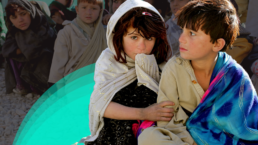When opposing the withdrawal from Afghanistan, D.C. hawks crowed about human rights. With U.S. sanctions causing starvation? Not so much.
By Murtaza Hussain, The Intercept
Months after the U.S.-backed Afghan government fell to the Taliban, ordinary Afghans now face what could be their direst winter in decades. Thanks to the economic collapse that accompanied the U.S. military withdrawal, coupled with the imposition of sanctions and the cessation of much humanitarian aid, millions of Afghans must contend with the very real prospect of starvation. Some will die. Many will lose their lives to preventable deaths.
While limited humanitarian exceptions for trade have been carved out in recent weeks, the World Health Organization has already warned that up to 1 million Afghan children may die as a result of malnutrition over this winter if drastic steps are not taken. Children are already bearing the brunt of the humanitarian catastrophe, punctuated by horrifying stories of kids being sold to pay for food. And the country’s notoriously harsh winter is already taking a toll: Afghans are freezing to death as they flee the country with their families.

U.S. sanctions policy is directly to blame, pushing Afghans over the edge as they already struggle to deal with the Covid-19 pandemic and the political upheaval created by the collapse of the central government. As Paul Spiegel, director of the Center for Humanitarian Health at Johns Hopkins Bloomberg School of Public Health, wrote this December, after returning from a trip to Afghanistan on behalf of the WHO, “I can clearly state that if the United States and other Western governments do not change their Afghanistan sanction policies, more Afghans will die from sanctions than at the hands of the Taliban.”
Recent Posts
Is A Citizens United 2.0 Right Around The Corner?
July 15, 2025
Take Action Now Is it possible for American democracy to be further degraded by the influence of billionaires? Thanks to champion of the working…
U.S. Leaders Gave Up On Diplomacy With Iran. We Must Make Them Return To It.
July 15, 2025
Take Action Now Building an antiwar movement means preventing the systemic U.S. aggression that creates the conditions for war.By Hanieh Jodat,…
What To Do When You See ICE In Your Neighborhood
July 14, 2025
Take Action Now How can you deter the Trump administration’s immigrant deportation machine when it pops up in your community? Follow these…
ICE Campaign Of Violence Will Lead To More Deaths
July 14, 2025
Take Action Now Jaime Alanis’s death shows the horrific consequences of a secret police force behaving with utter impunity.By Natasha Lennard, The…




